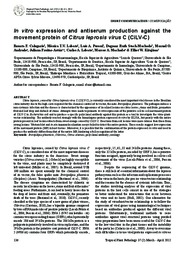In vitro expression and antiserum production against the movement protein of Citrus leprosis virus C (CiLV-C).
In vitro expression and antiserum production against the movement protein of Citrus leprosis virus C (CiLV-C).
Author(s): CALEGARIO, R. F.; LABATE, M. T. V.; PERONI, LUÍS A.; STACH-MACHADO, D. R.; ASTUA, J. de F.; LABATE, C. A.; MACHADO, M. A.; KITAJIMA, E. W.
Summary: Citrus leprosis, caused by Citrus leprosis virus C (CiLV-C), is currently considered the most important viral disease in the Brazilian citrus industry due to the high costs required for the chemical control of its vector, the mite Brevipalpus phoenicis. The pathogen induces a non-systemic infection and the disease is characterized by the appearance of localized lesions on citrus leaves, stems and fruits, premature fruit and leaf drop and dieback of stems. Attempts were made to promote in vitro expression of the putative cell-to-cell movement protein of CiLV-C in Escherichia coli and to produce a specific polyclonal antibody against this protein as a tool to investigate the virus-plantvector relationship. The antibody reacted strongly with the homologous protein expressed in vitro by ELISA, but poorly with the native protein present in leaf lesion extracts from sweet orange caused by CiLV-C. Reactions from old lesions were more intense than those from young lesions. Western blot and in situ immunolocalization assays failed to detect the native protein. These results suggest low expression of the movement protein (MP) in host tissues. Moreover, it is possible that the conformation of the protein expressed in vitro and used to produce the antibody differs from that of the native MP, hindering a full recognition of the latter. Key words: Brevipalpus phoenicis, Cilevirus, Citrus sinensis, polyclonal antibody, serology.
Publication year: 2012
Types of publication: Journal article
Unit: Embrapa Cassava & Fruits
Observation
Some of Embrapa's publications are published as ePub files. To read them, use or download one of the following free software options to your computer or mobile device. Android: Google Play Books; IOS: iBooks; Windows and Linux: Calibre.
Access other publications
Access the Agricultural Research Database (BDPA) to consult Embrapa's full library collection and records.
Visit Embrapa Bookstore to purchase books and other publications sold by Embrapa.

